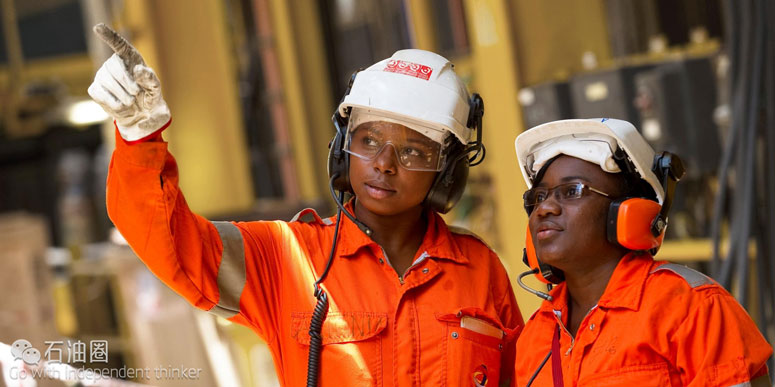The global CEO of Total talks safety, investment, and the future of the company in this exclusive interview with Energy Boardroom.
You often recall four words as central to the execution of Total’s mid-term strategy: safety, delivery, costs and cash flow. While Total has already announced severe cost reduction programs, the two that seem most difficult today are safety and cash flow, due to political unrest and low hydrocarbon prices. Out of those two, which is the one that worries you most?
Safety will systematically constitute a permanent key concern for Total, while our balance sheet is resilient enough to overcome challenges associated to cash flow.
We operate in countries like Yemen where security threats have arisen; in no circumstances can a company like Total accept to jeopardize its employees’ safety. In Yemen, as rebellious forces approached the Yemen LNG facilities, we have not only cautiously evacuated our expatriates but also all our local staff after having safely and orderly shutdown our operations. Recently we have also faced security threats in Kurdistan and in Libya, where we also chose to displace our staff.
We are aware that nowadays, safety may put the future of a company at stake as we have observed after the tragic Deep Horizon accident in the Gulf of Mexico. We are hence committed to ensure the highest safety levels for our operations. In our industry, we manipulate sophisticated technologies and are wary of the implications major accidents may have for the company’s future development.
With regards to cost cutting, while this might seem obvious today, it was not the case a few years back for the industry. Actually things had escalated to the point that many in the industry had forgotten that when working with commodities, it was essential to carefully manage your expenses and your cash break-even. In that sense this “crisis” might be beneficial. However, we are seizing this opportunity to introduce spending cuts where we deem appropriate.
In regards to cash flow, our income is correlated to hydrocarbon prices and Total is therefore more exposed when the barrel is at USD 55 than when it is at USD 120. We have consequently implemented the appropriate measures to respond to current market dynamics. Total has the financial capacity to weather the crisis and will not disengage from any major project.
This may sound as if Total or other major IOCs are “too big to fail”. Is this really the case?
I refute the concept of “too big to fail”! The world of energy is changing very fast. Our size may prevent us from collapsing in the short term, but we must remain extremely cautious and acknowledge what economic signals are expressing. If you look at the 50 largest companies 15 years ago, half of them disappeared. The energy sector itself has undergone unprecedented changes in the last fifteen years.
Price fluctuations, the unexpected advent of unconventional energies and competition between various forms of energy have provoked structural changes. For instance, ultra-deepwater or shale oil and gas have undeniably emerged in response to high hydrocarbon prices.
Energy is the necessary condition of human activity. I believe that the world will still need fossil energy in the future. It is however our responsibility to solve the issues that we undeniably contribute to creating, with regards to carbon emissions.
The most obvious way is to continue developing gas. A gas-powered plant produces half the emissions of a coal-powered plant and 1.5 times less than one powered by fuel oil. As an oil and gas company we can contribute by developing our LNG activities. The same factors explain why Total has invested in solar energy, with Sunpower.
The energy mix in 2040 will be different from what it is today, and the USD 3 billion invested in solar energy will definitively grow.
As a major oil and gas company, it is our responsibility to embrace and participate in the evolution of the energy mix and help define the notion of energy efficiency.
With regards to delivery, which are the main projects to come onstream in the coming years?
The notion of delivery is extremely important as we find ourselves in a heavy investment phase. From 2012 to 2016, Total‘s investments will have amounted to an average of USD 25 billion a year. Prospects for organic growth are thus very promising, which is why I insist on delivery.
Since the beginning of 2015, we have unveiled four new projects, including a gas venture in Russia, the onshore Termokarstovoye field, which will produce around 6.6 million cubic meters of gas and 20 thousand barrels of condensate per day, with a combined production capacity of 65 thousand barrels of oil equivalent per day.
Every project featured in our investment plan is critical.
The Laggan and Tormore fields – located approximately 125km north-west of the Shetland Islands – are of high importance because Total controls 80 percent and has invested to further develop their potential. We faced dreadful weather conditions, which have provoked important delays, but those fields represent the future of the UK oil and gas industry.
We have also invested in the Gladstone LNG project in Queensland, designed to produce Liquefied Natural Gas (LNG) from coalbed methane. This project strengthens Total’s foothold in the Australian market and rounds out our expertise in unconventional gas. We are also a partner in the Ichthys LNG project, as without a doubt, LNG is one of the strategic sectors for Total’s future growth.
We are furthermore currently undertaking a series of deep offshore developments in Angola, Congo and Nigeria, with respectively Kaombo, Moho and Egina.
Overall, Total thrives in two major vectors for growth. On the one hand, deep offshore projects – in for example Africa or Brazil – and on the other hand, gas and LNG projects – in for example Australia or Russia with Yamal.
As safety, cash flow, cost and delivery are the words of today, what would be the four words of theTotal of tomorrow?
My answer is: safety, gas, renewables and shared value.
Safety will always remain our main concern, without a doubt! I include gas because this market, which will represent a quarter of the world’s energy mix, is growing faster than oil, and still constitutes to this day the cleanest fossil fuel in terms of emissions. The world still hosts populations with limited or no access to energy. As a result, the demand for energy will grow and even if companies like Total invest in renewables, they will never satisfy global needs. At the moment, Total already produces equal amounts of oil and gas in contrast to a 65/35 ratio ten years ago.
When it comes to renewables, our current investments in solar amount to USD 3 billion, but is to steadily hike in the coming years. We are committed to remain pioneers in contrast to other IOCs. For many years, IOCs and NOCs adopted a conservative approach to new energy and I believe it is Total’s responsibility to recognize the challenge posed by climate change and provide its own solutions. By the way, we are not contradicting our commitment to produce highly profitable growth as the potential there is huge. Besides solar, we are also carefully examining opportunities in the field of biofuels.
And value, because creating added value to share it with our stakeholders is our ultimate objective, not only our shareholders but also our employees, the countries and communities where we work.
I would also like to add Africa to the list. I believe that the African continent symbolizes Total‘s future development and progress. Across the Mediterranean, Total excels in both upstream and downstream and I strongly believe that due to our history on the continent we will capitalize on Africa’s promising demographics and growth forecasts.
Safety, gas, renewables, value and Africa are the five words for the future of Total!


 石油圈
石油圈
